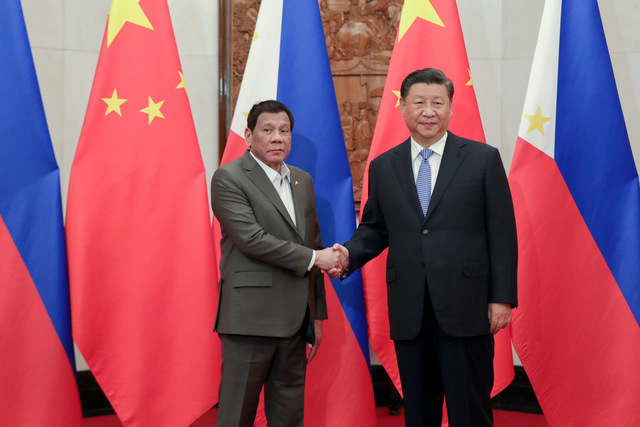30/08/2019
30/08/2019

WASHINGTON, Aug 29, (RTRS): Philippine President Rodrigo Duterte was in Beijing on Thursday for a meeting with counterpart Xi Jinping in which the Southeast Asian leader is expected to discuss a ruling on the disputed South China Sea. The 2016 Hague arbitration mostly invalidated China’s claim to virtually the entire South China Sea and found that it violated the UN Convention on the Law of the Sea.
The row over the waters – a major global shipping route thought to be rich in oil and gas reserves – has for years marred China’s relationship with the Philippines and other neighboring countries with territorial claims over the disputed area, where Beijing has transformed a string of disputed reefs into missileprotected island bases.
Duterte, however, has largely avoided the subject in favor of seeking warmer ties with Beijing. Philippine nationalists and left-wing groups have criticized the president for not immediately demanding Chinese compliance with the arbitration ruling, which came the same year Duterte took office. Philippine Ambassador to China Jose Santiago “Chito” Santa Romana told reporters Thursday that Duterte has mentioned the ruling to Xi several times, but not in a direct discussion as he plans to do this meeting. Duterte “has exerted a lot of diplomatic capital to build a reservoir of goodwill and friendship with President Xi,” Santa Romana said.
“So he has decided that it’s time to include in the diplomatic agenda and in the discussions sensitive issues that may have caused misunderstanding if it were brought up in the past.” Santa Romana added that Duterte is in Beijing “to build bridges, not to burn bridges with China.” It’s unlikely that Duterte’s move will have any effect on China, said Jay Batongbacal, a maritime affairs scholar at the University of the Philippines. “China’s position will not change just because Duterte changes tune,” Batongbacal said. “At best, Duterte might be seen as using the arbitration discussion as a move to leverage other concessions. At worst, it may be just for show.”
A US Navy destroyer sailed near islands claimed by China in the South China Sea on Wednesday, the US military said, a move that Beijing condemned as an illegal attempt by Washington at “maritime hegemony”. The busy waterway is one of a growing number of flashpoints in the US-Chinese relationship, which include an escalating trade war, American sanctions on China’s military, and US relations with Taiwan.
Reuters reported on Tuesday that China had denied a request for a US Navy warship to visit the port city of Qingdao. The US Navy vessel Wayne E. Meyer, an Arleigh Burke-class guided missile destroyer, carried out the operation, traveling within 12 nautical miles (14 miles/22 km) of Fiery Cross and Mischief Reefs, Commander Reann Mommsen, a spokeswoman for the Japanbased US Navy’s Seventh Fleet, said.
The operation was conducted “to challenge excessive maritime claims and preserve access to the waterways as governed by international law,” Mommsen said. The US military operation comes amid an increasingly bitter trade war between China and the United States that sharply escalated on Friday, with both sides leveling more tariffs on each other’s exports. The US military has a long-standing position that its operations are carried out worldwide, including in areas claimed by allies, and are separate from political considerations.
Encroached
Chinese military spokesman Li Huamin said in a statement early on Thursday that the US vessel had encroached upon Chinese territorial waters near the Spratly Islands without the government’s permission and had been warned to leave. “The facts prove that the United States’ so-called ‘freedom of navigation’ is actually an assertion of maritime hegemony that ignores international law, seriously harms China’s sovereignty and security interests, and seriously harms peace and stability in the South China Sea region,” Li said.
“We urge the US side to immediately stop such kinds of provocative acts, to avoid causing unexpected incidents.” China and the United States have traded barbs in the past over what Washington has said is Beijing’s militarization of the South China Sea by building military installations on artificial islands and reefs in disputed waters.
China’s claims in the South China Sea, through which about $5 trillion in ship-borne trade passes each year, are contested by Brunei, Malaysia, the Philippines, Taiwan and Vietnam. Beijing says its construction is necessary for selfdefense and that the United States is responsible for ratcheting up tensions by sending warships and military planes close to islands that Beijing claims.
Asked why China had denied the US request for the Qingdao port visit, Defense Ministry spokesman Ren Guoqiang did not give a direct answer, saying only that they had been in communication with the United States through military and diplomatic channels.
Ren, speaking at a regular monthly news briefing, implied it was to do with the overall poor state of relations. “We value developing the China-US military-tomilitary relationship but the US side should create positive conditions and atmosphere for the development of this relationship,” he added. China’s 2019 defense spending will rise 7.5 percent from 2018, according to a budget report. Its military build-up has raised concerns among neighbors and Western allies, particularly with China becoming more assertive in territorial disputes in the East and South China Seas and over Taiwan, a self-ruled territory Beijing claims as its own.
The US military last year put countering China, along with Russia, at the center of a new national defense strategy, shifting priorities after more than a decade-and-a-half of focusing on the fight against Islamist militants. Vice-President Mike Pence, in a visit to Iceland next week, will also have talks about “incursions” into the Arctic Circle by China and Russia, a senior Trump administration official said on Wednesday.


